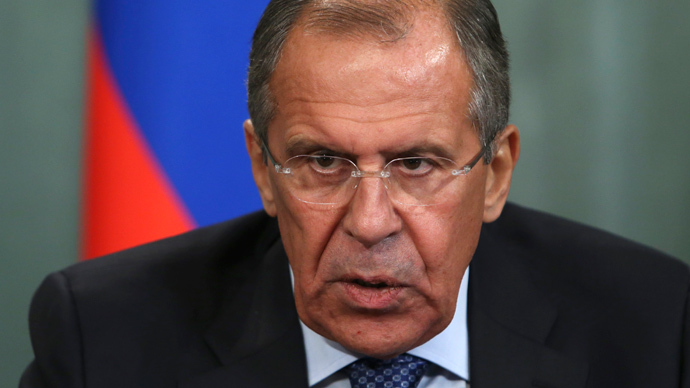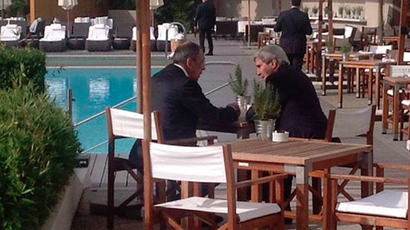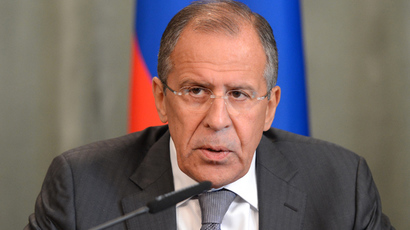Lavrov: UN Syria resolution holds both sides accountable for any chem weapons use

The UN Security Council resolution on Syria clearly states that both the Syrian government and the opposition must refrain from any future use of chemical weapons, Russian Foreign Minister Sergey Lavrov said in an interview with Russia’s Channel One TV.
Channel One:How difficult was it to come to an
agreement with the US this time, while working on the UN Security
Council draft resolution on Syria?
Sergey Lavrov: It was not easy. But we made sure that the
draft resolution, which has been compiled in support of another
document prepared by the Organization for the Prohibition of
Chemical Weapons (OPCW) – both documents [are] to be adopted
today in The Hague and in New York – follows the principles of
the Geneva accords that the US Secretary of State, John Kerry,
and myself reached on September 14.
The key principle is that the OPCW experts will play the leading
role, while the UN will provide additional support, particularly
by providing additional personnel, if necessary, and, most
importantly, by ensuring the security of the experts deployed to
the chemical weapons storage sites disclosed by the Syrian
government. Of course, the details of this work are yet to be
agreed, and this is why the resolution commissions the UN
Secretary General to work with the OPCW Director General and
prepare detailed guidelines. There is also another crucial point:
the resolution says that security measures are to be arranged in
cooperation with the Syrian government, but also that the Syrian
opposition will be held accountable in case it endangers OPCW
experts. And this is a matter of principle.
C1:We have had situations in the past when UN
resolutions were open to interpretation, as was the case with
Libya. The resolution spoke of a no-fly zone; it said nothing
about air strikes against government forces. Nonetheless, air
strikes followed. Isn’t there a risk that certain parties may try
and interpret the current resolution in their own way?
SL: I’ll put it this way: the possibility of any party
citing the current resolution as a pretext for the use of force
is out of question. The resolution on Libya was based on Chapter
7 of the UN Charter, which provides for a number of enforcement
measures ranging from warnings to sanctions and, ultimately, to
the use of force. This chapter was repeatedly suggested by our
European and US partners as the basis for the resolution. We are
categorically against this. We have learned the lesson of Libya
and, knowing the capabilities of our partners to interpret the UN
Security Council resolutions, we wanted to make sure there are no
pretexts or “loopholes” that can be used to justify a similar
course of action with respect to Syria. This resolution
absolutely rules out the use of force and in fact any use of
Chapter 7 of the UN Charter. This is verified by the fact that
the closing section of the resolution says that if any of the
Syrian parties, be it the government or the opposition, should
interfere with the work of the experts or use chemical weapons,
such incidents are to be immediately reported to the UN Security
Council and investigated. In case any of the parties are proved
to be guilty of a violation, the UN Security Council will address
the situation based on Chapter 7. In other words, the possibility
of invoking Chapter 7 has been moved into the future and this
will certainly require a new resolution, and, again, the
violation has to be proved with compelling evidence.

C1:What measures are being considered in regard to the
opposition, as there were opinions voiced that it might also have
chemical weapons?
SL: Not only they might, they do possess such weapons, and
the evidence of that is piling up. Just a few days ago we learned
of an intercepted phone conversation between two rebels, which
was also published by Kommersant. We raised this issue with our
colleagues from the US and Western Europe, as well as the other
states supporting the opposition, and asked them to demand that
their “fosterlings” refrain from any further attempts to lay
their hands on chemical weapons or components thereof, let alone
use chemical weapons, as we know that the opposition in Syria has
more than once tried to pull off such false flag operations.
So, those who support and directly sponsor the opposition bear particular responsibility to make sure such provocative actions never happen again.
I want to stress this again: The draft resolution lays
responsibility on all Syrian parties, both the government and the
opposition, to not use the chemical weapons. Furthermore, the
resolution says it is unacceptable for chemical weapons to fall
into the hands of non-government actors, which is what the rebels
basically are. It is particularly stressed that all UN member
states and especially Syria’s neighbors must take all necessary
measures for their territory not to be used to supply the
opposition with chemical weapons or their components.
C1:Once the OPCW secures control over all the chemical
weapons, will the entire stockpile be destroyed? Or may part of
it be moved, or kept in a safe place?
SL: In keeping with the Chemical Weapons Convention, the
Syrian government provided an inventory disclosing chemical
weapons sites. OPCW experts, Russia, the EU and the US have
acknowledged that the inventory is more than satisfactory. The US
told us that on a [scale of A to E] this inventory would be B+.
Of course, any inventory has to be verified, and this is why OPCW
inspectors will go to Syria within the next few days, where they
will work with the Syrian authorities to take control of chemical
weapons sites and verify the information they have received. I do
not rule out that there could be some corrections but I repeat,
experts have agreed that the bulk of the Syrian inventory looks
quite credible and provides them with enough material to get
their work started.
C1:Going back to the opposition, Russia has more than
once claimed to have proof that the opposition had chemical
weapons and presented this evidence to the UN. Has this
intelligence been published?
SL: Yes, it has been published. Our report on the Aleppo
incident of March 19 is available to all the members of the UN
Security Council, and I think it is even available to the general
public. It is a very professional report, and we have no doubt
that the sarin gas used in the March 19 attack near Aleppo was
homemade. Also, we have intelligence that the chemical weapon
used in the infamous August 21 incident was sarin gas of roughly
the same origin as the chemical used on March 19, only in a
higher concentration. We sent this data to our US partners and
the UN Secretariat. The Syrian government supplied us with the
data they had, showing the opposition’s involvement in a number
of incidents where chemical weapons were used. All these
materials require careful examination.
We do not try to unjustly claim a monopoly on the truth. It has
to be established through careful examination of every incident,
and the results of this investigation should be reported to the
UN Security Council, as the G8 leaders agreed at the summit in
Northern Ireland this June. So it is strange that the leaders of
some G8 countries say that it was clearly the Syrian government
that used chemical weapons on August 21; that this was a crime
against humanity, and that no further investigation is necessary.
This goes against the agreement the leaders of all the G8
countries reached in June, when they said all reports of chemical
weapons use should be reviewed collectively in the UN Security
Council after a professional investigation. We will insist on
following this procedure in the future as well.
C1:Why did it take weeks to reach an agreement?
SL: I do not want to sound incorrect in regard to our
partners at the talks, but we had to do everything possible to
ensure there were no deviations from the Geneva Communiqué, and
this took some time.














